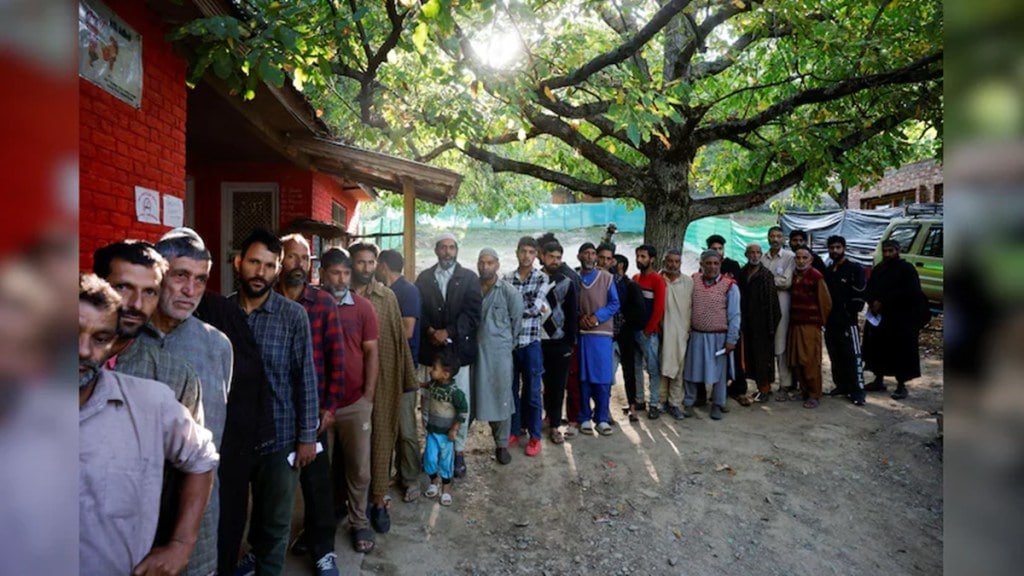By Farooq Wani
In spite of perceived anxieties, the three-phased assembly elections in Jammu and Kashmir (J&K) held on September 18, 25 and October 1 to elect 90 assembly members are done and dusted, and all eyes are now trained on October 8, when the results will be declared.
The 2024 election is significant for three reasons- one, it marked the strategically located region’s first assembly elections in a decade, two, it was the first election for J & K as a Union Territory, and three, it was promoted as a vote for change and development. The October 8 results are expected to reveal the impact of all three!
According to the Election Commission of India (ECI), the overall voter final turnout is now revised and pegged at an impressive 63.88 percent. The first phase of elections witnessed 61.38 percent voter turnout, while in the second phase 57.31 percent of voters cast their votes. The third phase voter turnout was 69.65 percent. Readers would recall that the 2014 overall voter turnout was 65.52 percent.
For Kashmiris, this election presented an opportunity to express their views on the socio-economic actions and policies of the past five years. For a region defined for decades by violence, terrorism, civilian unrest, corruption and socio-economic instability, the sweeping positive changes that have been initiated over the past five years mean a lot. These initiatives have allowed a new and progressive narrative to emerge and take firm root, ending years of self-serving political repression, jaundiced media coverage and uncalled for global interference in India’s internal affairs.
J&K’s electoral boundaries were changed in 2022, with 43 seats allocated for the Jammu Division and 47 for the Kashmir Division. In addition, the ECI added 2.5 million new voters to the electoral rolls by relaxing domicile restrictions. Hence it can most definitely be surmised that the 2024 vote is a vote for meaningful change and empowerment.
At the heart of this year’s polls is restoration of statehood, but whether the poll outcome will allow for a reinstatement of J&K’s autonomous status by revoking Article 370 and 35A promised by the opposition and anti-BJP parties remains a matter of serious doubt. Any attempt to restore these two controversial articles is likely to be nixed by the Centre, by Parliament and even by certain sections of Kashmiri society.
These elections saw active participation of Kashmiris from all sections of society and various communities, including fundamentalist outfits like Jamaat-e-Islami (indirectly), Other Backward Classes (OBCs), Valmikis, Scheduled Castes (SCs) and Scheduled Tribes (STs) (Gujjars & Bakerwals) and Kashmiri migrants in large numbers. This has convincingly exposed the lie being spread by vested interests that central and UT government authorities are attempting to initiate demographic change.
It is a positive development that there was no announcement of a boycott of the elections. The re-entry of the Jamaat-e-Islami has been welcomed by some in Kashmir and it cannot be said that this was a grand conspiracy “to fragment the electoral landscape of J & K” by supporting independent candidates.
Overall, the 2024 assembly election is undoubtedly a free and fair test of Kashmiri opinion in an environment that seems far better than what it was prior to 2019, when the climate was one of dispossession, disempowerment, intimidation, turbulence and corruption. Five years on, we see a transformational change for the better, though there are some sections that may feel otherwise.
The political landscape in J & K is fiercely competitive, which is why this year’s assembly elections is a high stakes one for main parties like the BJP, the National Conference (NC), the Congress and the People’s Democratic Party (PDP), besides some smaller ones.
The BJP is already a formidable force in Jammu, but would like to make an influential mark in the Kashmir Valley. These elections are also important for the dynast-dominant NC and the PDP, which are on the cusp of being pushed into political oblivion given their failed promises of the past.
As the main campaigner of the BJP, Prime Minister Narendra Modi has been at the forefront of a commitment to restore Jammu and Kashmir’s statehood, empower Kashmiris and take development to newer heights.
The most important feature of these elections is that they have been quite peaceful and celebratory, though the final outcome remains uncertain. Voters have shown patience and a strong faith in democracy. Their enthusiastic participation has been evident across all districts during the three-phased elections, underscoring a renewed spirit of civic participation and hope for a better future.
Chief Election Commissioner Rajiv Kumar was spot on when he said that the people of J&K have exhibited their determination and belief in the democratic process.
These elections are a resounding statement in favour of democracy and a defeat of nefarious and inimical interests.
Meticulous planning and constant vigil by the ECI and security forces have ensured that elections in J&K have passed off smoothly with no major law and order incidents reported. By and large, it has been a level playing field without bias, which for a sensitive region like J&K is a departure from past scripts and unprecedented. The ECI stood by its commitment to make the voting experience in J&K pleasant, accessible, inclusive and memorable.
The author is Editor Brighter Kashmir, Author, TV commentator, political analyst and columnist.
Disclaimer: Views expressed are personal and do not reflect the official position or policy of Financial Express Online. Reproducing this content without permission is prohibited.


